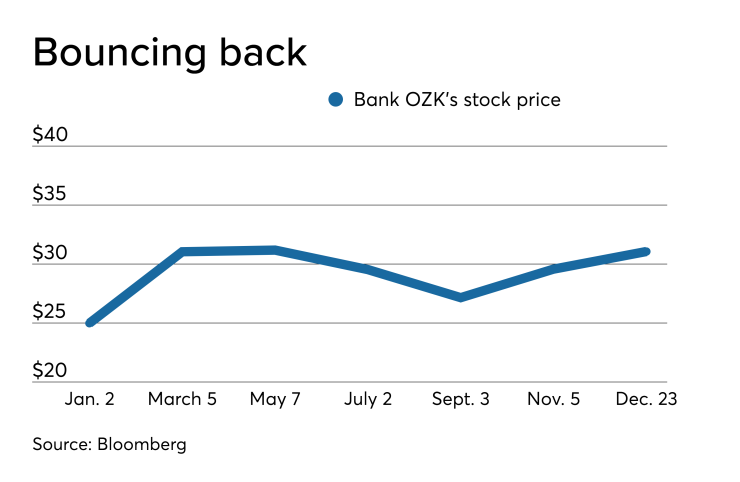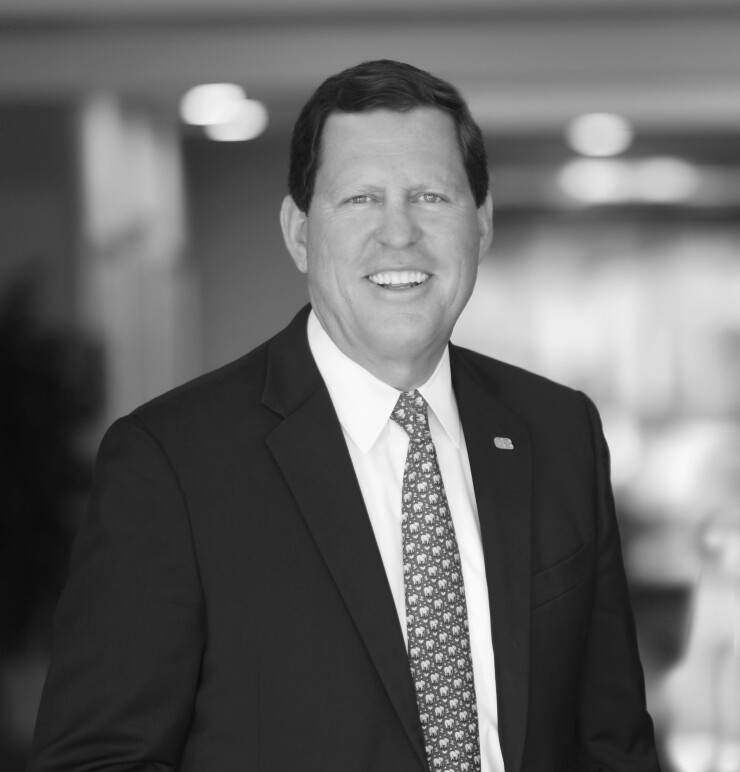The community banking team at American Banker meets this time each year to identify five executives we think will emerge as newsmakers in the year ahead.
We also like to look back on our bankers to watch from a year ago to see if they made news, and the 2019 crop did not disappoint.
James McLemore found a buyer two years after taking the helm at MidSouth Bancorp, while Christopher Myers announced plans to retire as the chief executive of CVB Financial. John Asbury overhauled the branding for what had been Union Bankshares.
George Gleason continued to assure nervous investors that sound underwriting for commercial real estate loans would help Bank OZK weather the next economic downturn, and James Blake made progress in his efforts to accelerate HarborOne Bancorp's transformation to a commercial bank.
What follows is a detailed recap of each of their stories. Stay tuned for the 2020 list, and profiles of each banker on it, over the coming week.
Bank OZK wins back investors
Gleason and Bank OZK
The Little Rock, Ark., company
During the second half of 2019, concerns shifted from the underlying quality of the bank’s CRE book to its ability to offset a surge in prepayments tied to declining interest rates and the short-term duration of the portfolio. Gleason has said repeatedly that his lenders will not compromise underwriting to simply bring in more loans.

The bank has also made progress winning back investors. Its shares rose by more than 35% this year and, by and large, have remained above $30 a share for most of December.
Not all of Bank OZK’s headlines were credit-related.
Bank OZK moved forward on plans to occupy a new corporate headquarters in Little Rock, which should take place in mid-2020. The bank also announced that it would invest more than $6 million to build a solar power plant that would provide energy for the headquarters and up to 40 other locations around Arkansas.
A new name for Union Bankshares
Asbury followed through on his plan to rebrand Union Bankshares in a move designed to eliminate confusion with rival United Bankshares as the Richmond, Va., bank expands well beyond its traditional market in central Virginia.
The $17 billion-asset company bought Access National in northern Virginia in early 2019, and longer-term plans could include expansion in and around Baltimore. It also operates seven offices in North Carolina, which it inherited in its 2018 acquisition of Xenith Bankshares.
The company announced in February that it would become Atlantic Union Bankshares, adding a regional element to its name while keeping its core identity. The name change took place in May, coinciding with the integration of Access National.

Asbury has made it clear that he intends to expand Atlantic Union through a combination of
Atlantic Union has recruited several regional bank executives in recent years to fill key roles at his company, including Maria Tedesco, formerly the chief operation officer for retail at BMO Harris Bank, to
Asbury finds himself in a good position to recruit talent as BB&T and SunTrust, which have substantial operations in Virginia, work their way through the megamerger that recently created Truist Financial.
MidSouth strikes a deal
Several industry observers were convinced that McLemore would
But he surprised virtually everyone in April when the $1.7 billion-asset MidSouth
It wasn’t a bad deal for a company that lost $27.5 million in 2018.
McLemore had been working on a turnaround since MidSouth
Under his leadership, energy loans fell from nearly a fifth of MidSouth’s overall portfolio in early 2017 to less than 13% when its sale to Hancock closed.
McLemore quickly resurfaced after MidSouth's sale, agreeing in December to become
For HarborOne, an acquisition and an IPO
HarborOne in Brockton, Mass., had already made plenty of headlines in 2018, when it completed its
Blake, HarborOne’s CEO, made it clear last year that he wants the company to reach $6 billion assets by 2024. It is well on its way, with nearly $4 billion in assets heading into the new year.
Much of 2019 was spent overhauling the company’s balance sheet. The purchase of Coastway Bancorp in Warwick, R.I., gave HarborOne more heft in small-business lending, additional core funding and nine branches.
Commercial real estate loans increased by 16% during the first nine months of 2019, to $1.1 billion on Sept. 30. Commercial loans rose by 8%, to $299 million. Residential real estate lending was essentially flat, and HarborOne reduced its exposure to auto loans.
HarborOne’s biggest headline in 2019 was the second-step conversion it completed in August to become a fully stock-owned company. The move brought in $304 million in net proceeds, of which $128 million is being held for purposes that could include another acquisition.
A surprise retirement at CVB
Myers surprised analysts in July when he announced plans to retire as CEO of CVB Financial in Ontario, Calif., in early 2020.
But for Myers, 57, the timing seemed right. He had spent 13 years building CVB into what is now an $11.3 billion-asset company with more than 60 offices across southern and central California, and is now eager for a new challenge.

“Our conversation with Myers … suggested that he accomplished what he sought to achieve and now wishes to prioritize other areas of his life,” Aaron James Deer, an analyst at Sandler O’Neill, wrote in a note to clients after the retirement was announced.
A big part of Myers’ growth strategy has been acquisitions. CVB bought the $3.7 billion-asset Community Bank
CVB has yet to name Myers’ successor, even though he is set to retire in March. A search committee was created to oversee the process. After retiring, Myers intends to stay on for a year as a consultant.





